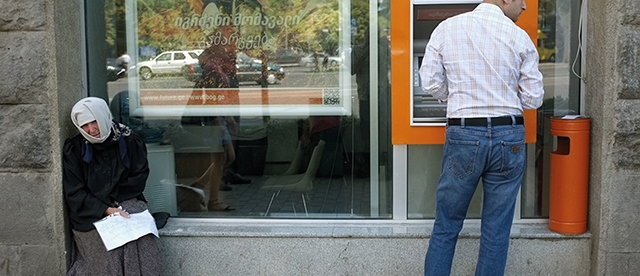Hunger & Poverty
Op-Ed
The deplorable duo of hunger and poverty, constituting one of the gravest of the everlasting global problems, has remained throughout the duration of human history, if only becoming worse at times. It continues plaguing hundreds of millions all over the world, and has its own effect on Georgia too. This is an officially declared status quo, corroborated not only by the actual facts, but by the promises of every Georgian government to fight and defeat the curse. Our politicians dwell upon the issue on every convenient occasion, especially when the opposition wants to incriminate the government, using any opportune topic of the day. The feuding sides’ figures of hunger and poverty, quoted in their speeches, happen to be so contradictory that we cannot even know which side to put our confidence in. One of them likely boosts and the other likely minimizes the available data.
Yet, it is not important whether the quoted figures are true or false: what matters is if there really is hunger and poverty in this country. It has always been a problem to know the truth, because the truth is not very easily accessible except for studies carried out by the national statistical service. Even if we wanted to set out to glean genuine information about hunger and poverty in Georgia, how would we identify every individual who is hungry or poor? My doubts about the national situation regarding hunger and poverty arise from what I see happening around me on a daily basis: the fuel-tanks full of gas, the streets full of cars and the cars full of passengers, ready to have fun. This is just one episode from our local social series. The other describes the food stores which have never been devoid of hungry but not very poor customers, even in times of the corona stupor and the consequential price jumps. The same can be said of all kinds of eateries, only in virus-free times of course.
The way our people like to dress in the same way in both urban and rural areas could be the third example. I have a fourth too: thousands of country houses in the vicinity of the capital city and beyond, with several cars parked in front of each cottage. How about the expensive private schools, educating thousands of kids – that should be number five! The sixth picture: you talk to any ethnic Georgian, male or female, youthful or advanced in years, famished or sated, indigent or well-to-do, and you will sense a conceited personality, gushing like a fountain of pride and self-confidence. This feature of character cannot be typical for the poor and hungry! Our people hate to be recognized as hungry and poor in general, although I am sure we have a considerable number of men, women and children who wouldn’t say no to an offered hand from their relatives, friends, neighbors and passersby, or the occasional financial assistance from the government.
And again, I am tripping over the scandalous controversy between the permanently sweating government and its outrageously exasperated opposition about whether the pandemic-based one-time financial assistance is being handed out to the crisis-stricken citizenry or not. We will never know! Each of those sides is feeding us its own truth, and we have no way to accost every presumable beneficiary of the governmental economic facility and ask them what in reality is happening. So there is only one way to stay contented when attacked by our doubts concerning the officially promulgated information about our governmental deeds. And that is the possibility that both sides are to be trusted and believed. How? Only via self-educating ourselves in matters political, and enhancing the public consciousness so much that all of us politicians and electorate believe with equal sincerity in the Republic’s Constitution, just as a believer believes in the Bible.
By Nugzar B. Ruhadze












